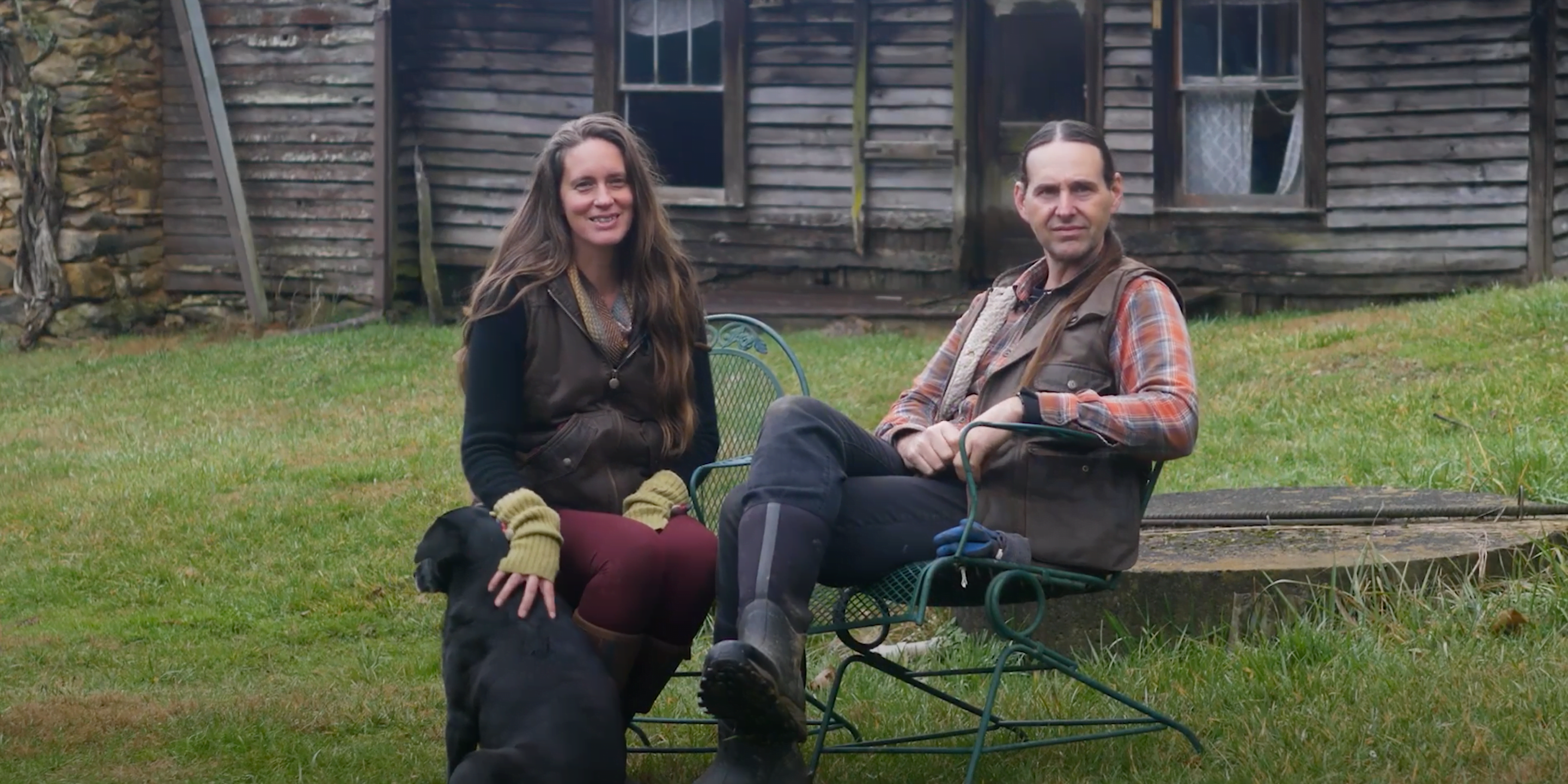The Forest Farmacy is a 30-acre forest farm nestled in Madison County, NC, in the Blue Ridge Mountains. Kat Houghton and Chris Parker bring together their passions for fungus, food sovereignty, healing, soul, myth, mystery, mycelium and re-culturing.
Kat: I’m Kat. This is the Forest Farmacy and we’re up in Madison County, Western North Carolina.
Chris: I am Christopher Parker. We chose the name The Forest Farmacy because we want to incorporate the farm into the forest, woodland medicinals as well as mushrooms.
Kat: There was a long history of one family just tending this land, and so we feel really really grateful to be able to have taken that over.
Chris: I would transplant things out of the forest and around even when I was a little kid and they would just take off. I was kind of obsessed with plants even as a pretty young child. I studied horticulture in high school and that’s actually where I was introduced to mushroom cultivation when I was 14.
Kat: I grew up in a farm in Scotland. We had sheep and cows on 600 acres on the Scottish borders. So that was that was how I grew up.
Chris: It’s a very independent lifestyle. That’s typically across the planet, most farmers are very independent. They tend to think outside the box because they have to.
Kat: I think the best part of being a farmer for me is being able to be so close to the natural world all the time. You know, we’re very dependent on what the weather’s doing and what the animals are doing, how the plants and mushrooms are growing. I really enjoy that.
Chris: Fungi are such a new thing that we cultivate. Having hurdles and obstacles to overcome in that world has kept my attention for such a long time.
Kat: Growing up on a farm I learned a huge amount just about, especially about how to be around animal,s how to tend to them. But the mushrooms are a whole different thing for me, so I’ve been learning from Chris.
Chris: Originally why I got into mushroom cultivation was because it seemed like a very low-input, maximum-yield type cultivation, because I was introduced to log cultivation. So log cultivation is you do a lot of the work up front. You plug the logs and then the logs continue to fruit, oftentimes for anywhere from three to six, seven, eight years. We grow vegetables for ourselves. We grow mushrooms. And we also do forest medicinals.
Kat: So mycorrhizal fungi are fungi that live in symbiosis with plants. They exchange water and nutrients to the to the plants and they receive sugars from the plant. so it’s a beneficial relationship for both the fungus and the plants.
Chris: Mushrooms are such a curious group of creatures. Out of estimated five million species on the planet, we know of about 150,000, so there’s still so many we do not know about. And that’s the thing that keeps me excited about this is that you know there’s so much more to be discovered.
Kat: I’ve always loved mushrooms eating and being disappointed by what’s available in the grocery store.
Chris: Culinary mushrooms are all medicinal. They all have some type of medicinal compounds. If people are making stuff like bone broth or veggie broth or soups and stuff like that, that’s a really easy thing to do to throw just some mushrooms in there. Run them on low for several hours. They’re extracting those medicinal benefits plus the flavor.
Kat: This sort of tradition in this area of small-scale family farming is really important to us. There’s a great community of local farmers here. I know Chris will exchange mushrooms for different produce and vegetables, so a lot of our food comes from our neighbors. Passing on the knowledge is a significant part of what we do here as well. ASAP has been really helpful. We received a grant from them earlier this year to produce some new marketing materials, so a lot of the signage we have at the farmers market and some brochures and things. They’ve got a great network of other people, conferences that we go to.
Chris: I think the vision for the farm is to continue you on the trajectory of education. One of the other things I would like to see is to do more research with mycorrhizals. But also just for us to produce as much of the food that we can produce for ourselves here. I know that’s one of our goals.
Kat: I think part of the vision, too, is reconnecting humans to nature, all with the intention of helping us sort of get back to that the ancient connection that we’ve always had and that we have drifted from in our modern culture. People just spending time here is healing. Being mindful in nature really helps people to to find a place of healing.
This video was created as part of ASAP’s Growing Minds Farm to School program. Resources for including these as part of a classroom curriculum are available on the Growing Minds website.

